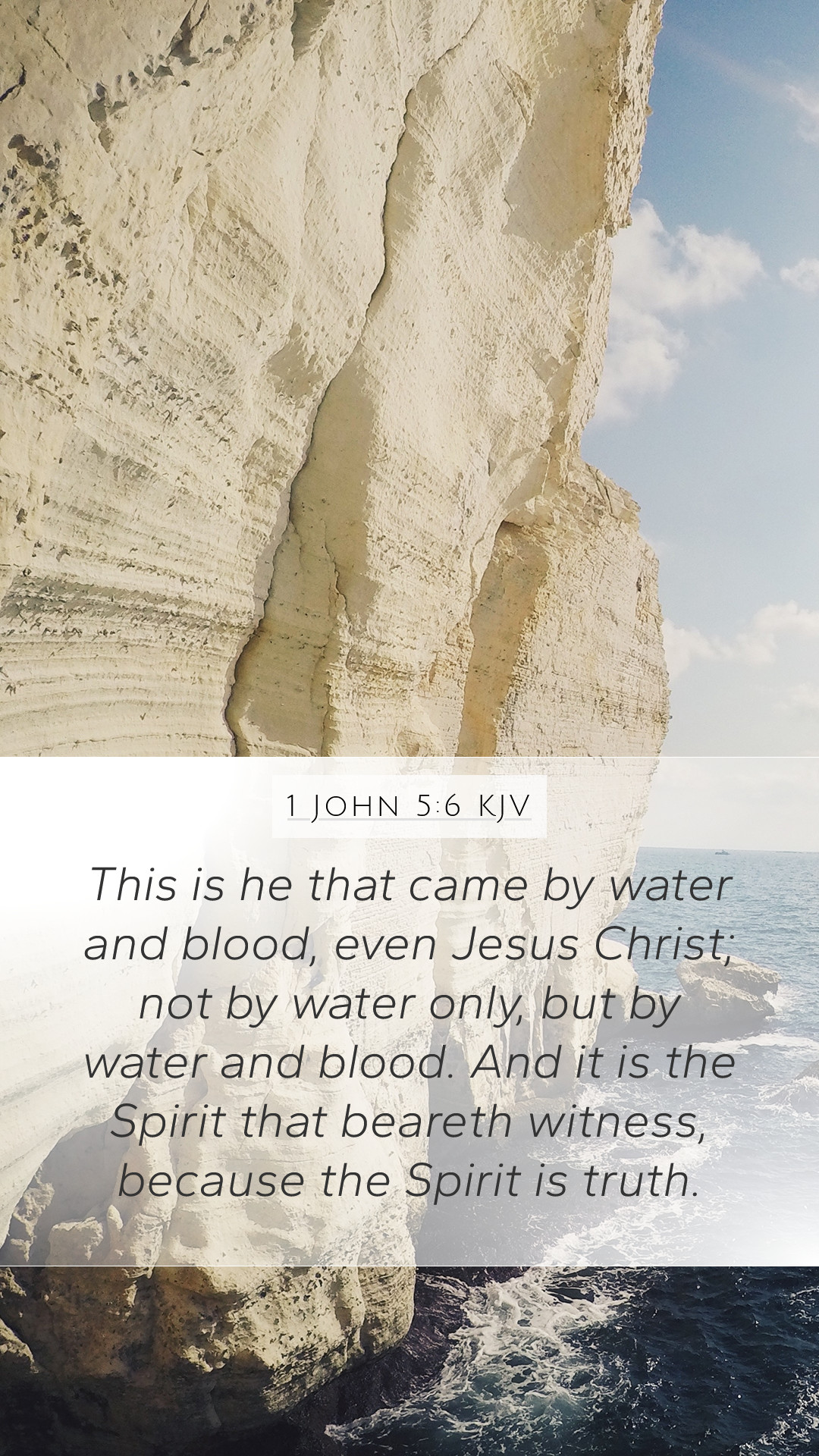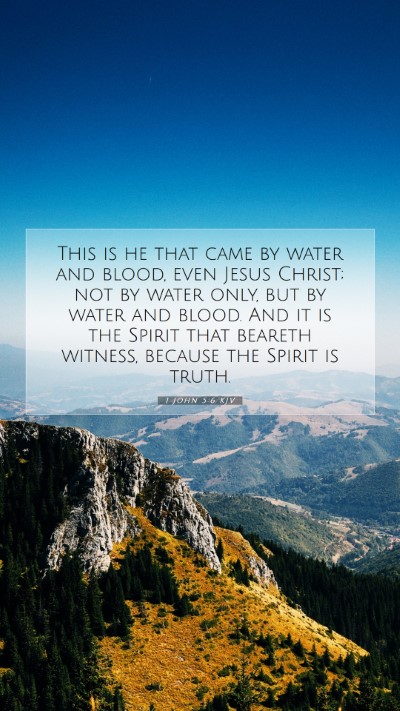Old Testament
Genesis Exodus Leviticus Numbers Deuteronomy Joshua Judges Ruth 1 Samuel 2 Samuel 1 Kings 2 Kings 1 Chronicles 2 Chronicles Ezra Nehemiah Esther Job Psalms Proverbs Ecclesiastes Song of Solomon Isaiah Jeremiah Lamentations Ezekiel Daniel Hosea Joel Amos Obadiah Jonah Micah Nahum Habakkuk Zephaniah Haggai Zechariah Malachi1 John 5:6 Meaning
What is the meaning of 1 John 5:6?
This is he that came by water and blood, even Jesus Christ; not by water only, but by water and blood. And it is the Spirit that beareth witness, because the Spirit is truth.
1 John 5:6 Bible Verse Meaning
Understanding 1 John 5:6: A Comprehensive Bible Verse Commentary
This Bible verse, 1 John 5:6, carries profound meanings and implications for believers and scholars alike. In this exploration, we delve into the biblical exegesis and interpretations provided by esteemed public domain commentaries such as those by Matthew Henry, Albert Barnes, and Adam Clarke. Through their insights, we cultivate a deeper understanding of this scripture.
Verse Breakdown
1 John 5:6 (KJV): "This is he that came by water and blood, even Jesus Christ; not by water only, but by water and blood. And it is the Spirit that beareth witness, because the Spirit is truth."
Contextual Analysis
This verse is part of a letter penned by John the Apostle, addressing a community grappling with heretical beliefs concerning the nature of Christ. Understanding the historical and cultural context is crucial for deep scriptural analysis.
Background Themes
- Testimony of Jesus: The mention of water and blood signifies the dual nature of Christ's ministry—His baptism and sacrificial death.
- Rejection of Heresies: John aims to counteract Gnostic beliefs that denied Jesus' full humanity and thus His true sacrificial role.
- The Role of the Spirit: The passage emphasizes the importance of the Holy Spirit in affirming the truth of Jesus’ identity and mission.
Bible Verse Meanings and Interpretations
Insights from Matthew Henry
Henry draws attention to the significance of Jesus coming "by water and blood,” indicating His full participation in human experience and the necessity of His atoning sacrifice. He elaborates that while water (baptism) signifies His holy beginning and identification with humanity, blood symbolizes His suffering and redemption.
Albert Barnes' Commentary
Barnes articulates that the phrase "not by water only, but by water and blood" serves to correct misunderstandings about Christ's nature. He insists that both elements are essential for understanding Christ’s mission on Earth—highlighting a clear rejection of any doctrine that minimizes either aspect of Christ's work.
Adam Clarke’s Exegesis
Clarke proposes that this verse confirms the real humanity of Jesus, which was integral to His role in salvation. He also emphasizes that the Holy Spirit's witness is foundational for believers—guiding them to the truth of Jesus’ identity and His work.
Summation of Key Insights
- The Reality of Christ's Humanity: Both His baptism and crucifixion are emblematic of His complete involvement in human salvation.
- Authentic Witness of the Spirit: The Holy Spirit serves as a witness to the truth of Jesus, affirming His incarnate work.
- Application to Believers: Understanding Jesus’ dual aspects enriches our faith and encourages reflection on His testament of love and sacrifice.
Cross References
For an enriched study, consider the following related scriptures:
- John 1:14: "And the Word was made flesh, and dwelt among us..."
- Matthew 3:16-17: The baptism of Jesus as a pivotal moment of His ministry.
- 1 John 5:8: Serves to further expound on the witness of the Spirit, water, and blood.
- Romans 5:8: Highlights the significance of Christ’s sacrificial love for humanity.
- Matthew 26:28: Jesus’ emphasis on His blood's role in the new covenant.
Conclusion: Engaging with 1 John 5:6
In conclusion, 1 John 5:6 stands as a vital passage for understanding the complex nature of Jesus Christ and the Christian faith. Through diligent Bible study and reflection on this verse, believers can appreciate the importance of both His baptism and sacrificial death as integral to their faith journey.
For those engaging in Bible study groups or online Bible study, this commentary serves as a resource for deeper discussions and exploration of scripture. The blend of water and blood in Jesus’ narrative calls for thoughtful reflection on His dual role as the Son of God and Savior of humanity.


